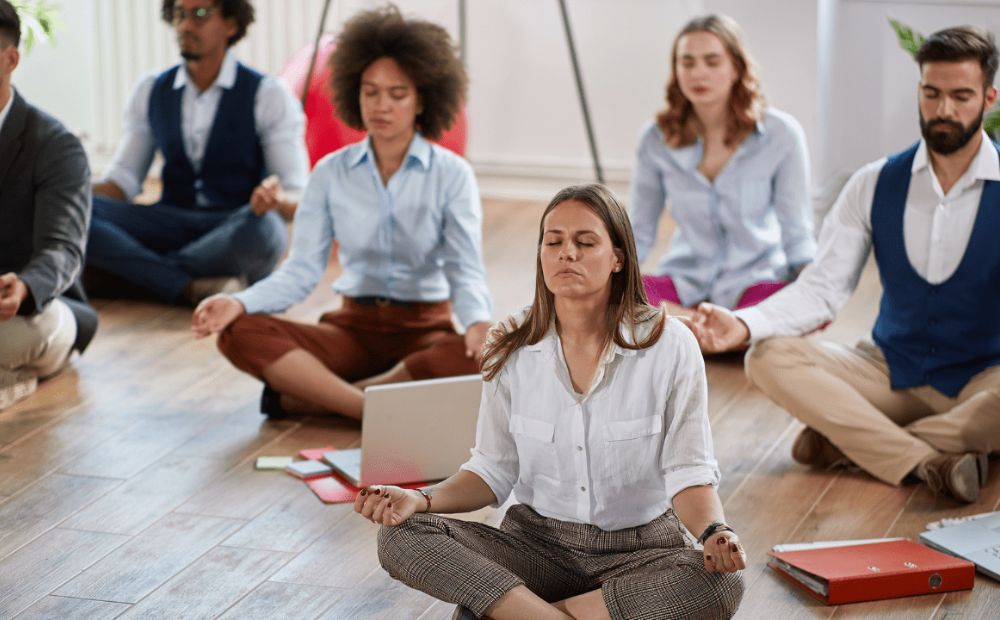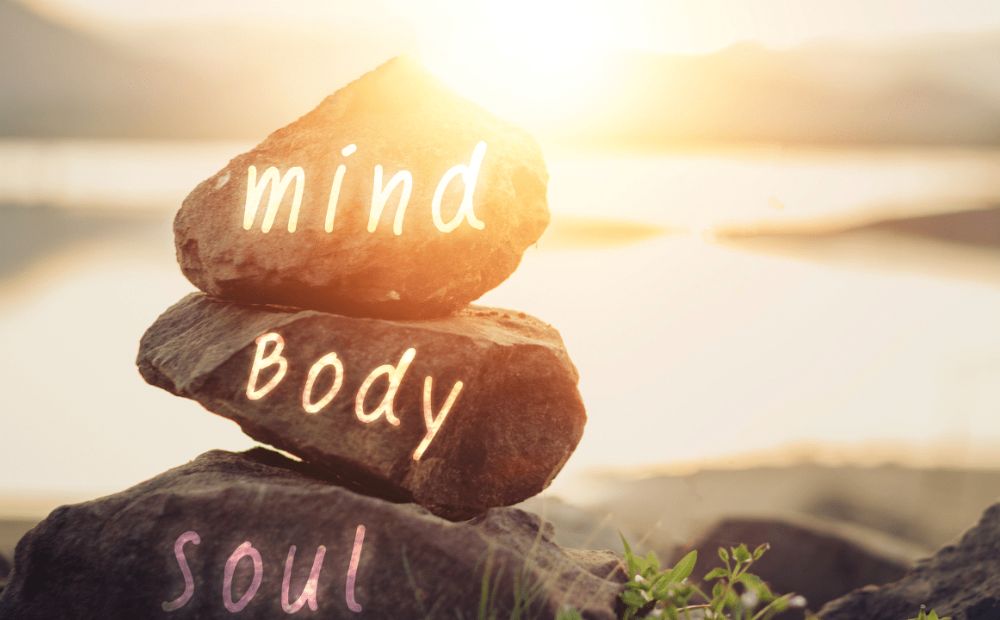Welcome to the world of meditation—a journey of self-discovery, inner peace, and mindfulness. In this first section, we’ll embark on a path that’s accessible to everyone, regardless of whether you’ve never meditated before or you’re simply looking for easy techniques to kickstart your practice.
Meditation, often shrouded in mystery, is, at its core, a simple and beautiful practice that has been embraced by cultures around the world for centuries. It’s not about wearing robes, sitting on mountain tops, or having a profound experience every time you close your eyes. It’s about finding a moment of stillness in the midst of life’s hustle and bustle, a moment that allows you to connect with yourself, cultivate calm, and explore the potential of your mind.
You might be wondering, “Why should I meditate, and how can I possibly start?” Well, you’re in the right place. We’re about to demystify meditation for beginners, making it as approachable as your morning cup of tea or coffee.
Meditation isn’t reserved for gurus or spiritual masters; it’s a practice that can benefit everyone, including you. Whether you’re looking to reduce stress, enhance your focus, improve your sleep, or simply find a few moments of peace in your day, meditation offers a myriad of benefits that can positively impact your life.
So, if you’ve ever felt curious about meditation or wondered how to get started, keep reading. We’ll guide you through easy meditation techniques, explore the science behind its benefits, and provide practical tips to make meditation a seamless part of your daily routine. No need to sit cross-legged on a mountaintop—your journey to meditation begins right here, right now.
The Accessibility of Meditation

Now that you’ve taken your first step into the world of meditation, let’s delve into an aspect that makes this practice truly remarkable: its accessibility. Meditation is a universal practice that welcomes individuals from all walks of life, regardless of age, fitness level, or prior experience.
Meditation: A Practice for Everyone
Meditation doesn’t discriminate. It’s not limited by age, gender, physical abilities, or even religious beliefs. Whether you’re a teenager struggling with academic stress, a working professional seeking mental clarity, or a retiree looking to embrace tranquility, meditation can be your faithful companion on this journey.
No Special Equipment Required
One of the most inviting aspects of meditation is its simplicity. Unlike some hobbies or practices that demand specialized gear or expensive memberships, meditation requires nothing more than your presence and willingness. You don’t need to invest in a fancy yoga mat, wear a particular attire, or purchase costly equipment. Your mind is the most essential tool for meditation, and it’s already with you.
Anywhere, Anytime
Another remarkable feature of meditation is its flexibility regarding where and when you can practice. Whether you’re in the comfort of your home, at the office during a break, or sitting on a park bench, you can meditate. It can be a five-minute pause during a hectic day or a longer session when you have more time to spare. The choice is entirely yours.
Meditation as a Daily Ritual
Consider meditation as a daily ritual, much like brushing your teeth or having a meal. You can integrate it seamlessly into your life, making it a regular part of your routine. In fact, carving out even a few minutes each day can yield significant benefits over time.
In the world of meditation, there’s no need for elaborate preparations or special conditions. It’s a practice that meets you exactly where you are, embracing your uniqueness and encouraging you to explore the vast landscape of your inner world. So, whether you’re new to meditation or looking to rekindle your practice, remember that the path is open to all, and the possibilities are endless. In the next section, we’ll dive into the profound stress-reducing benefits that even beginners can experience through meditation.
Stress Reduction Through Meditation
In our fast-paced and often chaotic world, stress has become a constant companion for many of us. But what if I told you that one of the most compelling reasons to start meditating is its remarkable ability to reduce stress? Yes, even for beginners, meditation offers a tranquil oasis amid life’s daily challenges.
The Stress Epidemic
Before we delve into how meditation can be your stress-busting ally, let’s acknowledge the omnipresence of stress in modern life. It’s the tension that builds up during rush hour traffic, the relentless demands of work, the never-ending notifications on our devices, and the constant juggling of responsibilities. Stress can manifest physically, mentally, and emotionally, leading to fatigue, irritability, and even health issues.
Meditation: Your Calm Amid the Storm
Now, imagine having a secret weapon in your arsenal—an effective tool to manage and alleviate stress. That’s where meditation comes in. It’s like a soothing balm for the mind, offering respite from the turbulence of daily life. Even if you’re new to meditation, you can quickly experience a sense of calm and relaxation through basic techniques.
The Science of Stress Reduction
The stress-reducing effects of meditation are not mere folklore; they’re backed by science. When you meditate, your body’s stress response, often called the “fight or flight” response, gradually yields to the relaxation response. This shift in your body’s state can lead to a cascade of positive effects, including reduced blood pressure, decreased heart rate, and a sense of tranquility.
Beginner-Friendly Stress Relief
Meditation for beginners doesn’t involve complex rituals or hours of practice. Even a short, simple meditation session can help you step away from the whirlwind of stress. The act of sitting quietly, focusing your attention, and allowing thoughts to come and go without judgment can be surprisingly effective.
Daily Stress Reduction Ritual
Think of meditation as your daily ritual for stress reduction. Just as you would take a few minutes each day to unwind with a cup of tea or a good book, you can dedicate a few moments to meditation. Over time, this practice can become a sanctuary where you find solace and rejuvenation, allowing you to navigate life’s challenges with greater ease.
In the next section, we’ll explore how meditation enhances your focus and concentration, making it a valuable tool for both personal and professional growth. So, if you’ve ever struggled with staying attentive in our increasingly distracted world, meditation can be your solution.
Enhancing Focus and Concentration
In a world filled with constant distractions, maintaining focus and concentration has become a precious skill. Fortunately, meditation offers a powerful solution, even for beginners. In this section, we’ll explore how meditation can enhance your ability to concentrate and keep your mind sharp.
The Modern Attention Challenge
The 21st century has ushered in an era of information overload, with notifications, emails, and social media vying for our attention. It’s no wonder that our ability to focus is often tested. Whether you’re studying, working, or simply trying to complete a task, maintaining concentration can be a daily struggle.
Meditation as a Mental Workout
Think of meditation as a workout for your mind. Just as physical exercise strengthens your body, meditation strengthens your mental muscles. When you meditate, you practice directing and sustaining your attention, a skill that can be transferred to various aspects of your life.
Heightened Mental Clarity
Even for beginners, meditation can lead to heightened mental clarity. As you sit in stillness and silence, you gradually learn to tame the wild stream of thoughts that often inundate your mind. This process allows you to observe your thoughts without getting entangled in them, creating mental space and calm.
Improved Concentration in Daily Life
The benefits of enhanced focus and concentration extend beyond your meditation sessions. You’ll find it easier to stay on task, resist distractions, and complete projects efficiently. Whether you’re studying for an exam, working on a complex project, or even reading a book, meditation equips you with the mental stamina needed to excel.
Cultivating Presence
Meditation teaches you the art of being present—fully engaged with the task at hand. In a world where multitasking is often celebrated, meditation reminds you that true productivity arises from undivided attention. You’ll discover that by immersing yourself fully in each moment, you can savor experiences more deeply and achieve greater results.
A Few Minutes for Greater Focus
The beauty of meditation is that it doesn’t require hours of your time. Even as a beginner, you can experience the benefits with just a few minutes of daily practice. By setting aside a brief moment to meditate, you’re investing in your ability to concentrate and excel in various aspects of your life.
The Journey to Mental Clarity
As you continue on your meditation journey, you’ll find that mental clarity and improved concentration are not distant goals but attainable milestones. Meditation empowers you to reclaim your focus in a world that often scatters it. In the next section, we’ll explore how meditation can foster emotional well-being and self-awareness, offering you greater control over your inner world.
Emotional Well-being and Self-awareness
Beyond its surface-level benefits, meditation is a profound tool for nurturing emotional well-being and cultivating self-awareness. In this section, we’ll delve into how even beginners can tap into the transformative power of meditation to gain greater control over their inner world.
Emotions: The Heart of the Human Experience
Emotions are an integral part of being human. They color our experiences, shape our decisions, and influence our relationships. However, navigating the landscape of our emotions can sometimes be challenging. Stress, anxiety, and negative thoughts can cloud our emotional clarity.
Meditation as Emotional Medicine
Meditation offers a unique form of emotional medicine, helping individuals manage and understand their emotions more effectively. By simply sitting in stillness and observing your thoughts and feelings without judgment, you can begin to untangle the complex web of emotions that often ensnares us.
Embracing Mindfulness
A core component of meditation is mindfulness—a state of open and nonjudgmental awareness of the present moment. This mindfulness extends to your thoughts and emotions, allowing you to observe them as they arise, change, and eventually dissipate. This practice fosters emotional intelligence and resilience.
Reducing Reactivity
One of the primary benefits of meditation is the reduction of emotional reactivity. As a beginner, you’ll notice that over time, you become less prone to reacting impulsively to challenging situations or emotional triggers. Instead, you’ll develop the ability to respond calmly and thoughtfully.
Self-awareness: The Key to Personal Growth
Meditation shines a spotlight on self-awareness—the ability to understand your thoughts, emotions, and behaviors. This self-reflection is essential for personal growth. By becoming more aware of your inner world, you gain greater control over your responses and choices.
Observing Without Judgment
In meditation, you’ll practice observing your thoughts and emotions without judgment. This skill translates into your daily life, allowing you to embrace your emotions without labeling them as good or bad. You’ll learn to acknowledge your feelings without being overwhelmed by them.
A Compass for Life’s Challenges
Meditation equips you with a compass to navigate life’s challenges with greater emotional resilience. Instead of being at the mercy of your emotions, you’ll become their master, capable of choosing how to respond to situations in a way that aligns with your values and goals.
The Gentle Unfolding of Self-awareness
As a beginner, you may not experience these benefits overnight. Self-awareness is a lifelong journey, and meditation is your trusted companion on this path. With each session, you’ll take a step closer to understanding yourself on a deeper level, embracing your emotions, and mastering your responses to life’s ebb and flow.
In the next section, we’ll explore how meditation can offer better sleep and share practical tips for integrating meditation into your daily routine. If you’ve ever struggled with insomnia or simply longed for a more restful night’s sleep, meditation may hold the key to your dreams.
Better Sleep Through Meditation
Have you ever tossed and turned in bed, unable to quiet your mind and find the restful sleep you crave? If so, you’re not alone. Insomnia and sleep disturbances are common challenges in today’s fast-paced world. However, meditation, even for beginners, can be a game-changer when it comes to improving the quality of your sleep.
The Modern Sleep Conundrum
In our hyper-connected world, where screens glow late into the night and stressors linger in our minds, sleep has become an elusive treasure for many. Countless individuals find themselves lying in bed, desperately seeking the solace of slumber, yet finding their thoughts racing and their sleep drifting further away.
Meditation: A Path to Restful Sleep
The practice of meditation offers a reliable pathway to more restful nights. By calming your mind and embracing relaxation, you can prepare your body and thoughts for a deep and rejuvenating sleep, even as a beginner.
Creating a Bedtime Ritual
Think of meditation as a bedtime ritual that signals to your body and mind that it’s time to unwind. As you gently guide your thoughts away from the day’s worries and stressors, you create a mental space for sleep to take root.
Quieting the Mental Chatter
One of the most common obstacles to sleep is a racing mind. Thoughts of the past and worries about the future can create a mental cacophony that keeps you awake. Meditation teaches you to quiet this mental chatter and embrace the serenity of the present moment.
Breathing Techniques for Relaxation
As a beginner, you can start with simple breathing techniques. Deep, rhythmic breathing not only relaxes your body but also eases your mind into a state of tranquility. It’s a practice that anyone can master, and it can be your ticket to the peaceful sleep you’ve been longing for.
Embracing the Present Moment
Meditation emphasizes the importance of being present, both in your waking life and as you transition into sleep. By focusing on the sensations of your breath, the feeling of your body on the bed, and the sounds of the night, you create a sense of presence that supports restful slumber.
The Joy of Waking Refreshed
Through meditation, you can discover the joy of waking up feeling refreshed, rejuvenated, and ready to face the day. By making meditation a part of your bedtime routine, you set the stage for a peaceful night’s sleep, free from the burdens of insomnia and restless thoughts.
A Journey to Better Sleep
As a beginner, you may find that it takes time to reap the full benefits of meditation for sleep. However, the journey is a rewarding one. With each night of restful sleep, you’ll awaken to a world that feels more manageable, and you’ll approach each day with greater clarity and vitality.
In the next section, we’ll explore how meditation nurtures the mind-body connection, fostering a deeper understanding of how your thoughts and emotions impact your physical well-being.
Embracing the Mind-Body Connection

In the hustle and bustle of modern life, it’s easy to overlook the profound connection between your mind and body. Yet, this connection plays a pivotal role in your overall well-being. Meditation, even for beginners, invites you to explore this relationship and gain a deeper understanding of how your thoughts and emotions can impact your physical health.
The Mind-Body Connection Unveiled
The mind and body are not separate entities; they are intricately intertwined. Your thoughts, emotions, and stress levels have a direct influence on your physical health. When you’re stressed, anxious, or overwhelmed, your body responds in kind, potentially leading to a range of health issues.
Meditation as a Bridge
Meditation serves as a bridge between your mental and physical realms. When you meditate, you bring your awareness to the sensations in your body, allowing you to observe how your emotions and thoughts manifest physically. This heightened awareness can be illuminating, offering insights into the intricate dance between your mind and body.
Stress Reduction and Physical Well-being
One of the most tangible benefits of meditation is stress reduction. As a beginner, you may notice how meditation calms your mind and soothes your body. This reduction in stress can have a positive impact on your physical health, potentially lowering your blood pressure, reducing inflammation, and bolstering your immune system.
Pain Management and Meditation
For those dealing with chronic pain or discomfort, meditation can be a powerful ally. By redirecting your attention away from pain and focusing on the present moment, you can gain relief and improve your ability to cope with physical discomfort.
The Wisdom of the Body
Through meditation, you can also tap into the wisdom of your body. It communicates with you through physical sensations, allowing you to recognize and address discomfort, tension, or areas of vulnerability. This heightened awareness empowers you to make conscious choices that support your physical well-being.
Physical Relaxation in Meditation
In your meditation practice, you’ll learn to relax your body systematically. This physical relaxation not only eases tension but also encourages overall health and vitality. It’s a practice that can benefit you both during meditation and throughout your daily life.
Mindful Eating and Well-being
Meditation extends to your relationship with food through mindful eating. By being fully present during meals and savoring each bite, you can develop a healthier and more balanced approach to nourishing your body.
A Holistic Approach to Health
As you embark on your meditation journey, you’ll discover that well-being is a holistic concept. It encompasses not only the absence of physical ailments but also the integration of mental, emotional, and spiritual harmony. Meditation, even for beginners, can be your guide on this holistic path, fostering a deeper connection between your mind and body.
In the next section, we’ll explore how meditation encourages mindfulness in everyday life, allowing you to be fully present in each moment and savor the richness of your experiences.
Mindfulness in Everyday Life
In a world that often pulls us in countless directions, the practice of mindfulness shines as a beacon of presence and awareness. Meditation, especially for beginners, is a gateway to embracing mindfulness in everyday life. In this section, we’ll explore how meditation fosters mindfulness and allows you to savor the richness of each moment.
The Rush of Modern Life
The modern world is characterized by speed, distractions, and the constant pull of technology. It’s easy to find ourselves rushing from one task to another, often without fully experiencing the present moment. This constant busyness can leave us feeling disconnected and unsatisfied.
Mindfulness: The Art of Presence
Mindfulness is the antidote to this rush. It’s the art of being fully present in each moment, savoring the richness of life as it unfolds. It’s about immersing yourself in your experiences, whether they are ordinary or extraordinary, and finding joy in the simple act of being.
Meditation as a Mindfulness Training Ground
Meditation is a powerful training ground for mindfulness. When you meditate, you cultivate the skill of paying attention to the present moment. You learn to observe your thoughts, emotions, and physical sensations without judgment, bringing a gentle curiosity to your inner world.
Carrying Mindfulness into Your Day
The mindfulness skills honed during meditation can be seamlessly carried into your daily life. As a beginner, you’ll begin to notice that you can apply the principles of mindfulness to various situations. Whether you’re eating a meal, taking a walk, or engaged in a conversation, you can be fully present.
Enhanced Experiences through Mindfulness
Mindfulness allows you to extract more meaning and fulfillment from your experiences. You’ll find that even mundane activities become opportunities for wonder and appreciation. The colors of a sunset, the taste of your morning coffee, and the laughter of loved ones all take on a deeper significance.
Stress Reduction through Mindfulness
Mindfulness also serves as a buffer against stress. By staying rooted in the present moment, you can prevent worries about the future or regrets about the past from hijacking your peace. This ability to maintain perspective in the face of stress is a valuable asset in modern life.
Improved Relationships
Mindfulness can transform your relationships as well. By being fully present in your interactions, you can listen more attentively, empathize more deeply, and communicate more effectively. This can lead to stronger connections and greater understanding in your personal and professional relationships.
A Fulfilling Life in the Present
As you continue your meditation practice, you’ll discover that mindfulness is not a fleeting experience but a way of life. It’s an invitation to embrace the beauty of each moment, regardless of its nature. By grounding yourself in the present, you can lead a more fulfilling and meaningful life.
In the next section, we’ll delve into how meditation creates positive changes in the brain, supporting your cognitive functions and enhancing your overall well-being. So, if you’re curious about the science behind meditation’s effects, read on.
Positive Brain Changes Through Meditation
While the benefits of meditation are often felt on a deep, personal level, there is also a remarkable scientific dimension to this practice. Meditation has been found to induce positive changes in the brain, leading to cognitive improvements and enhanced overall well-being. In this section, we’ll explore how meditation affects your brain and why it’s often referred to as a “mind workout.”
The Plastic Brain
The human brain is a dynamic and adaptable organ. It has the remarkable ability to change its structure and function in response to experiences and activities. This adaptability is known as neuroplasticity, and it means that your brain can be reshaped throughout your life.
Meditation and Neuroplasticity
Meditation is a powerful catalyst for neuroplasticity. When you engage in regular meditation, you stimulate various regions of your brain, promoting structural changes that can lead to a range of cognitive benefits.
Increased Gray Matter Density
One of the most intriguing findings in meditation research is the increase in gray matter density in specific brain regions. Studies have shown that regular meditation can lead to a thicker cortex—the outer layer of the brain responsible for higher-order functions such as memory, learning, and self-awareness.
Enhanced Cognitive Functions
As a beginner, you may not immediately notice these structural changes, but you’ll likely experience enhanced cognitive functions. Meditation can sharpen your focus, improve your memory, and boost your problem-solving abilities. It’s like giving your brain a daily workout, strengthening its cognitive muscles.
Stress Reduction on a Neural Level
Meditation’s effects on the brain are also evident in its ability to reduce stress. The practice calms the amygdala, a region associated with the brain’s stress response, while strengthening the prefrontal cortex, responsible for rational thinking and decision-making. This neural rebalancing leads to a greater capacity to manage stress.
Emotional Regulation
The brain changes induced by meditation also extend to emotional regulation. As a beginner, you’ll find that meditation helps you respond to emotions with greater equanimity. This is due to shifts in brain activity that enable you to observe your emotions without being overwhelmed by them.
The Long-term Impact
While the immediate benefits of meditation are valuable, it’s essential to view this practice as a long-term investment in your brain’s health. Just as physical exercise yields cumulative improvements in fitness, consistent meditation leads to lasting changes in brain structure and function.
A Journey of Discovery
As you progress on your meditation journey, you’ll gain a deeper appreciation for the profound impact it has on your brain. The changes may be subtle at first, but over time, you’ll experience the cognitive enhancements and emotional resilience that come with regular meditation.
In the next section, we’ll discuss how beginners can easily access guided meditation resources, providing step-by-step instructions and support to enhance their practice. So, if you’re looking for guidance on how to start and sustain your meditation journey, stay tuned.
Utilizing Guided Resources for Beginners
Starting any new endeavor can be both exciting and challenging, and meditation is no exception. As a beginner, you might wonder where to begin and how to ensure you’re on the right path. Fortunately, there are numerous guided meditation resources available that provide step-by-step instructions and support to enhance your practice.
The Power of Guided Meditation
Guided meditation sessions are like having a friendly and experienced meditation teacher right in your pocket, ready to lead you on your journey. These resources offer a structured and reassuring way for beginners to dive into the world of meditation.
What Is Guided Meditation?
Guided meditation involves listening to a recorded or live voice that instructs you throughout your meditation session. It typically includes cues for breathing, relaxation, and visualization, making it easy for you to follow along, especially if you’re new to meditation.
Benefits for Beginners
- Structured Guidance: Guided sessions provide clear and structured guidance, helping you stay focused and relaxed during your practice.
- Variety: There are guided meditations for various purposes, such as stress reduction, sleep improvement, and self-confidence. This variety allows you to explore different aspects of meditation.
- Convenience: You can access guided meditation resources on your smartphone, tablet, or computer, making it convenient to practice wherever and whenever you choose.
- Progressive Learning: Many guided programs are designed to help you progress from beginner to advanced levels gradually. This ensures that you continue to challenge and develop your meditation skills.
Types of Guided Meditation
Guided meditation comes in various forms, including:
- Meditation Apps: There are numerous meditation apps available, such as Headspace, Calm, and Insight Timer. These apps offer a wide range of guided sessions tailored to different needs and preferences.
- Online Videos: Platforms like YouTube feature countless meditation videos led by experienced instructors. You can explore different styles and teachers to find what resonates with you.
- Meditation Websites: Many websites offer guided meditation recordings that you can stream or download for free. These resources often include written instructions and tips.
- Live Classes: If you prefer a more interactive experience, consider joining live online meditation classes or workshops. This allows you to connect with instructors and fellow practitioners in real-time.
Getting Started with Guided Meditation
To begin with guided meditation as a beginner:
- Choose Your Resource: Explore different apps, websites, or videos to find a guided meditation resource that aligns with your goals and preferences.
- Set a Comfortable Space: Find a quiet and comfortable space where you won’t be disturbed during your meditation sessions.
- Select a Session: Pick a guided meditation session that matches your current needs, whether it’s stress relief, better sleep, or emotional balance.
- Use Headphones: For an immersive experience, consider using headphones to enhance the quality of the audio guidance.
- Commit to Consistency: Establish a regular meditation routine. Even a few minutes a day can yield benefits, and consistency is key to progress.
- Explore and Evolve: Don’t hesitate to explore different guided resources and teachers. Your meditation journey is a personal one, and you may find certain styles or instructors resonate with you more than others.
Guided meditation can be a valuable companion for beginners, providing the support and structure needed to kickstart and sustain a meditation practice. It’s an excellent way to navigate the world of meditation with confidence and ease. In the next section, we’ll discuss how meditation can be seamlessly integrated into modern lifestyles, allowing you to enjoy its benefits in the midst of your busy day.
Meditation Sounds: Meditation Serenity




[…] sessions, or that things like energy work or mindfulness are just too complicated to try. Actually, simple daily habits like mindful breathing, journaling, or gentle movement lay down a solid […]